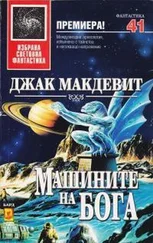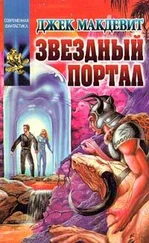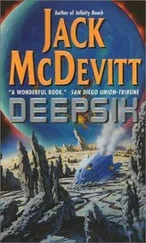Monitors indicated almost no damage to the complex, save for the Allison amplifier, which was ironically the guts of the Schramm.
Ordinarily, Ward would simply have sent out a tech to fix the problem. But he wanted to see World’s End one more time before he went back to Earth. Furthermore, he told himself, Amy should be exposed to the facility she was about to direct.
He carried the replacement amplifier in a canvas bag slung over his right shoulder. It bounced against his side as he walked uphill. It was good to be back. The air in his helmet was cool and fresh. It moved across his face, tasting of ozone, as if there had just been a thunderstorm. The suit was bulky, but not burdensome in the light gravity.
The complex loomed ahead dark and vaguely gothic in the starlight. “It has a lot of atmosphere,” Ward said.
Amy chuckled. “You got that right.” And it may have been that something in his voice caught at her. “You’re really attached to this place, aren’t you?”
He shrugged. “Yeah,” he said. “I guess so. It’s the last outpost.” He slowed down for her, mindful that she was not used to the gravity.
“How do you mean?”
“Everything’s unmanned now. The Titan mission will be unmanned. Mars is unmanned. They even pulled us out of here.”
“But, Edgar, there’s no point keeping anyone here now. You can sit back at Moonbase and run things just as easily.”
“I know. And there’s no point sending people to Titan either. But what’s the point of going if we don’t really go?”
They crunched up a mild incline and stopped in front of the annex. Ward raised a remote. Lights blinked on inside. He touched it again, and the connecting passageway to the dome lit up. The airlock door swung open.
“I envy you,” he said. “But at the same time, I’m glad I’m leaving.”
They passed into the lock and he started the cycle.
“You’re right,” she said. “We are entering an exciting period.”
He nodded. They were closing in finally on the great questions. Was the universe open or closed? Flat? Or twisted? What had happened to the quantum energy of the original vacuum? What was the nature of the force that had called the cosmos into being? Why did the galaxies recede only at discrete velocities?
In better days, he and his small band of colleagues, isolated on the far side of the moon, had enjoyed the illusion that they were at the front of the wave, that they were in fact virtually alone in running the universe to ground, inhibited only by the demanding voices from Greenwich, Harvard, and Sidney.
She gazed at him thoughtfully. “What are your plans, Edgar?”
“CalTech. I’ll be working with Lasker.”
“You don’t sound all that enthusiastic.”
“Oh, it’s a good situation.” Maybe there was a sense that his life had peaked and started downhill. Maybe it had to do with returning to the scratching and clawing of workaday cosmology. Maybe he was just tired.
The annex was more sterile than he remembered it: a large two-story open well not unlike a garage. Offices ringed the upper level. A rover, a crane, and a pair of motorized dollies were parked in their stalls. Cabinets and cases and empty pallets lined the walls. Life Support was off to their right.
Ward struggled out of his pressure suit and hung it in the rack. The temperature, which was usually maintained a few degrees above freezing to protect the equipment, had been raised to a balmy sixty-eight.
Amy was a slender woman, in all senses of the word. On the moon, she weighed maybe seventeen pounds. She appeared to be approaching fifty, but Cal Wilkin, who had worked with her during her Harvard years, said she’d trampled that figure long ago. Her eyes were green and animated. There was something of the aristocrat about her: he suspected she had been born into money. He knew she had gone to the best schools, and was accustomed to being treated with deference. He grinned at the thought of the demands, whines, and threats she would have to deal with in parceling out time on the big scope.
He pointed to a heavy door in the rear of the building. “Back there,” he said, “are the old living quarters. Room for eighteen people. Although we never had that many. But we did get a lot of visitors.” At one time, World’s End had been the lunar showcase. VIP’s always swung by the great observatory, to look through the eyepiece, and drink coffee with the recluses.
The passageway to the dome connected on their left. Ward touched a presspad. Circuits bleeped and sighed. The door retracted into the overhead. He heard her catch her breath: the walls were transparent and seemed to open out into the moonscape. The lighting was soft, and the shadows of the rocks blended with those of the furnishings. Padded chairs and worktables were neatly arranged in clusters. Several wooden tubs were set off to one side. “We had a lot of greenery here at one time,” he said. In those days this lounge area had been filled with blossoms and potted trees. One of the tables was still set for poker, which had been the game of choice.
They stepped through, and the lock sealed behind them.
He dimmed the lights, and they might have been standing on the naked surface. The stars blazed overhead. It was a stunning effect.
Amy stared out at the sky. “It’s gorgeous,” she said.
“Like nowhere else.”
He opened up the air lock at the far end, and they strolled into the dome. Ward had always been proud to show off the Schramm. It tended to awe the dullest of visitors. It was the instrument of Jhard’ahl and Pierce and Brandenberg. “A lot of history has been made here,” he said.
The telescope dwarfed them. It was as big as a jumbo jet. But it was far lovelier. Its cream-colored casing was smooth and tapered and exquisitely balanced in a network of struts and braces and beams. It was enormous, and its power and beauty stirred his soul. Magnificent.
The observer’s cage was mounted on the side of the telescope, seven stories overhead. It was accessible from one of the two turrets that supported the instrument. Deep within the reflector, tiny motors whirred. The Schramm was moving, the entire dome was moving, adjusting to the motion of the Moon, tracking a target. Ward took out a notebook. “4C-1651,” he said.
“What’s so funny?”
“It’s tracking Keeler’s quasar. Do you know Keeler? He’ll be one of your biggest problems. At this moment he’s getting a screwed-up image. He’s not happy, and he’s probably on the circuit screaming at Ops.”
“Well, I suppose he has reason to be upset.”
“He upsets at a low level.” Ward was about to launch into a Keeler story when the third shock hit.
A ripple rolled through the floor, and the lights dipped. He tightened his grip on the amplifier. Before he was quite certain what had happened, the sensation was gone. The internal motors seemed to kick up a notch. That might mean the telescope had been jarred out of position, and they were making adjustments.
“That was a big one,” said Amy. She glanced around uncertainly. “Are we okay?”
“I think so.”
The observer’s cage suddenly looked desperately high. Not a place to be during a quake. Damn. He wondered whether any more jolts were coming. It almost seemed as if the old place was irritated with him.
He went into the operations office, and activated the commlink. “Moonbase,” he said, “this is Ward.”
“Go ahead, Edgar.” Bill Clayton’s voice. The duty officer.
“We are going offline with the Schramm.”
“That’s a roger. How long do you expect to be down?”
He looked at Amy. “Hard to say.” He might need only to reset the present unit. An hour or so. On the other hand, the amplifier could be wedged in tight. “Could be a few hours,” he said. That would be more than enough time. But it would upset a lot of people who were using the scope.
Читать дальше









